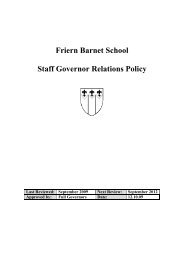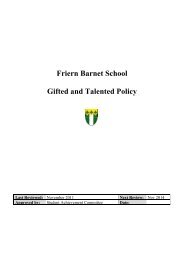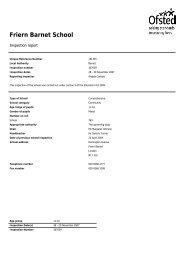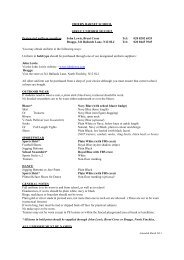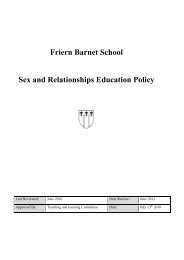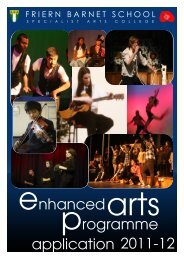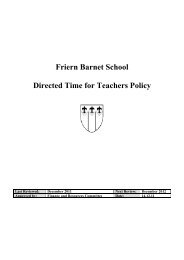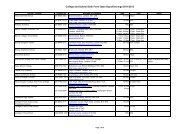Friern Barnet School Collective Worship Policy
Friern Barnet School Collective Worship Policy
Friern Barnet School Collective Worship Policy
Create successful ePaper yourself
Turn your PDF publications into a flip-book with our unique Google optimized e-Paper software.
<strong>Friern</strong> <strong>Barnet</strong> <strong>School</strong><br />
<strong>Collective</strong> <strong>Worship</strong> <strong>Policy</strong><br />
Last Reviewed: November 2011 Next Review: January 2013<br />
Approved by: Teaching and Learning Committee Date:
Rationale<br />
All maintained schools provide daily collective worship for registered students (apart from those who have been<br />
withdrawn by their parents). This is usually provided within a daily assembly. In consultation with the<br />
Governing Body, the Headteacher is responsible, under the <strong>School</strong> Standards and Framework Act 1998, for<br />
arranging the daily collective worship. The precise nature will depend on the family background, ages and<br />
abilities of the pupils. However, if it is inappropriate for some or all of the pupils to take part in Christian<br />
collective worship, the Headteacher may apply to the local Standing Advisory Council on Religious Education<br />
(SACRE) for a determination to have this requirement lifted. <strong>Collective</strong> worship can take place at any time in<br />
the school day and the whole school does not need to get together at the same time. <strong>Collective</strong> worship can be<br />
organised into Form or Year groups or whatever is appropriate for the school.<br />
Aims<br />
The aim of the collective worship policy is to provide the opportunity for students to:<br />
• develop a community spirit, a common ethos and shared values<br />
• develop a sense of being part of the wider community and celebrate difference and diversity<br />
• celebrate achievements and special occasions related to individuals, the school and the wider community<br />
• reflect on values that are of a broadly Christian nature and on their own beliefs<br />
• consider spiritual, moral social and cultural issues<br />
• respond to the ‘Theme of the Week’<br />
• experience stillness and quiet times for personal reflection<br />
• begin to understand the nature and purpose of worship<br />
Practice<br />
The timing and organisation of daily collective worship can be flexible and involve students, staff, governors<br />
and external speakers as appropriate.<br />
The ‘Theme of the Week’ will be reflected in assemblies and Tutor Periods throughout the week.<br />
The weekly pattern for assemblies is Key Stage 4 Assembly on Monday, Key Stage 3 Assembly on Tuesday<br />
and three additional Year Group Assemblies from Wednesday to Friday, some of which may be led by a tutor<br />
group. Every third week all assemblies are House Assemblies.<br />
<strong>Collective</strong> worship, whether in assembly or tutor time, will:<br />
• be acceptable to the whole community, staff and students<br />
• include a variety of elements at different times<br />
• involve the students<br />
Parental Partnership and the Right to Withdraw<br />
The main aim of our collective worship is for it to be meaningful and relevant to all students and staff, for those<br />
with a faith background and those with none. It is therefore hoped that few parents will feel that they have to<br />
remove their child from collective worship.<br />
2
Parents do, however, have the right to withdraw their child without any explanation. If a parent asks for their<br />
child to be wholly or partly excused from attending any collective worship at the school the school must<br />
comply. The school remains responsible for the supervision of any child withdrawn from collective worship,<br />
unless the child is taking part in collective worship elsewhere. Parents do not need to explain their reasons for<br />
seeking withdrawal. However, in order to avoid misunderstanding, the Headteacher may wish to clarify with<br />
any parent wanting to withdraw:<br />
• the religious issues about which the parent would object their child being taught<br />
• the practical implications of withdrawal<br />
• the circumstances in which it would be reasonable to accommodate parents’ wishes<br />
• if a parent will require any advanced notice of such issue in the future and if so, how much notice<br />
Monitoring and Review<br />
The school staff and governors will review this policy and assess its implementation and effectiveness annually.<br />
3





